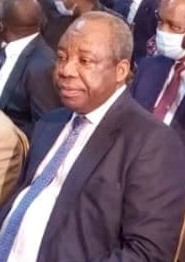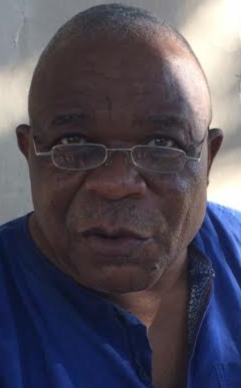Related Research Articles

Pierre Oba is a Congolese security official who has served in the government of Congo-Brazzaville as Minister of Mines since 2005. During the 1980s, he served successively as Director of Presidential Security and as Director-General of Public Security. Later, he was Minister of the Interior from 1997 to 2002 and Minister of Security from 2002 to 2005. He is also a Général de Brigade of the National Police.
Ambroise Édouard Noumazalaye was a Congolese politician who was Prime Minister of Congo-Brazzaville from 1966 to 1968, under President Alphonse Massamba-Débat. Later in life he served as Secretary-General of the Congolese Labour Party (PCT) and was a supporter of President Denis Sassou Nguesso. He served as President of the Senate from 2002 to 2007.
André Obami Itou is a Congolese politician. He has been a leading figure in the Congolese Labour Party (PCT) since the 1970s, and he has been the President of the Senate of Congo-Brazzaville from 2007 to 2017.
Ange Édouard Poungui is a Congolese politician. Poungui was the Prime Minister of Congo-Brazzaville from 7 August 1984 to 7 August 1989 under President Denis Sassou Nguesso. He was chosen as the candidate of the Pan-African Union for Social Democracy (UPADS) for the 2009 presidential election, but was barred from running.

Pierre Nzé is a Congolese politician and diplomat. During the single-party rule of the Congolese Labour Party (PCT), he held leading positions in the government and party. Later, he was Minister of State for Justice from 1997 to 1999, and he served in the Senate of the Republic of the Congo from 2002 to 2011.
Antoine Ndinga Oba was a Congolese diplomat, political figure, and linguist. During the single-party rule of the Congolese Labour Party (PCT), he served in the government of Congo-Brazzaville as Minister of National Education from 1977 to 1984 and as Minister of Foreign Affairs from 1984 to 1991. Later, he was Congo-Brazzaville's Ambassador to UNESCO from 1998 until his death in 2005.
Justin Lekoundzou Itihi Ossetoumba was a Congolese politician. He was a founding member of the Congolese Labour Party (PCT), and during the PCT's single-party rule he held important party and government positions in the 1970s and 1980s. He served in the government again from 1997 to 2002 and was elected to the National Assembly of Congo-Brazzaville in 2002.
Pierre-Damien Boussoukou-Boumba is a Congolese politician. During the single-party rule of the Congolese Labour Party (PCT), he served in the government of Congo-Brazzaville as Minister of Health from 1979 to 1984, as Minister of Scientific Research from 1984 to 1989, and as Minister of Basic Education from 1989 to 1991. He was Ambassador to the United States in the 1990s and Minister of Small and Medium-Sized Enterprises from 1997 to 2002; subsequently he was a Deputy in the National Assembly of Congo-Brazzaville from 2002 to 2007. Boussoukou-Boumba was also President of the Union for the Defence of Democracy (UDD), a political party, from 1996 to 2011.

Pierre Moussa is a Congolese politician who has been President of the Commission of the Economic and Monetary Community of Central Africa since 2012. He served in the government of Congo-Brazzaville as Minister of Planning from 1979 to 1991; later, he was Minister of Spatial Planning from 1997 to 2002, Minister of Planning from 2002 to 2009, and Minister of State for the Economy and Planning from 2009 to 2012.
Jeanne Dambendzet is a Congolese politician. She served in the government of Congo-Brazzaville from 1989 to 1991 and again from 1997 to 2009. Since 2009 she has been the First Vice-President of the Economic and Social Council, a state institution. She is a member of the Congolese Labour Party (PCT) and has been National Executive Secretary of the Women's Organization of Congo, the PCT's women's organization, since 2013.

Henri Djombo is a Congolese politician who has served in the government of Congo-Brazzaville as Minister of State for Agriculture since 2016. Previously he was Minister of Water and Forests from 1980 to 1985 and Minister of the Forest Economy from 1997 to 2016. He is a member of the ruling Congolese Labour Party (PCT).
Florent Ntsiba is a Congolese politician. A high-ranking and long-time figure under President Denis Sassou Nguesso, Ntsiba initially rose to prominence through the military in the single-party regime of the Congolese Labour Party (PCT) in the 1970s. He was Minister of Information from 1979 to 1983; although he fell out of favor with the party leadership in 1983, he returned to the government as Minister of Equipment from 1989 to 1991.

Henri Ossébi is a Congolese sociologist and politician who served in the government of Congo-Brazzaville as Minister of Energy from 2011 to 2016. Previously he was Minister of Higher Education from 2002 to 2009 and Minister of Scientific Research from 2009 to 2011.
Jean-Michel Bokamba-Yangouma was a Congolese politician. He was a prominent political figure from the 1970s to the 1990s, heading the Congolese Trade Union Confederation. He was the President of the General Movement for the Construction of Congo, a political party.
Auguste-Célestin Gongarad Nkoua is a Congolese politician and the President of the Patriotic Union for Democracy and Progress (UPDP), a political party. He served in the government of Congo-Brazzaville as Minister of Agriculture and Animal Husbandry from 1991 to 1992, as Minister of Water and Forests from 1992 to 1993, and again as Minister of Agriculture and Animal Husbandry from 1997 to 2002. Subsequently, he was President of the Economic and Social Council, a state institution, from 2003 to 2009. In 2009, he was appointed as President Denis Sassou Nguesso's Personal Representative for Political Affairs.
Claude-Ernest Ndalla is a Congolese politician. First coming to prominence as a radical youth leader in 1960s Congo-Brazzaville, he was one of the leading members of the Congolese Labour Party (PCT) in the period immediately following its founding in 1969, but after a few years his career fell into a long decline due to factional struggles within the PCT. Later, he served in the government of Congo-Brazzaville as Minister of Youth Redeployment and Sports from 1997 to 1999, and he has been a Special Adviser to President Denis Sassou Nguesso since 2003.

Clément Miérassa is a Congolese politician who has been President of the Congolese Social Democratic Party (PSDC) since 1990. He served in the government of Congo-Brazzaville as Minister of Trade from 1991 to 1992 and as Minister of Industrial Development from 1992 to 1993. Miérassa was also a minor candidate in the 1992 presidential election as well as the 2009 presidential election.
Michel Ngakala is a Congolese military officer and politician who is a leading member of the Congolese Labour Party (PCT), the ruling party in the Republic of the Congo, serving as its Permanent Secretary for Organization. He was Commander of the Congolese People's Militia during the 1980s, and he was the High Commissioner for the Reintegration of Former Combatants, a role that involved the implementation of peace agreements with rebels, from 2001 to 2012.
Alexandre Denguet Atticky was a Congolese politician. Under the single-party rule of the Congolese Labour Party (PCT), he served in the government of Congo-Brazzaville as Minister of Labour from 1971 to 1975 and was Ambassador to France in the late 1970s. From 2002 to 2012, Denguet Atiki was a Deputy in the National Assembly, and he was also President of the Parliamentary Group of the Presidential Majority from 2007 to 2012.
Daniel Abibi is a Congolese politician, mathematician and diplomat. During the 1980s, he served in the government of Congo-Brazzaville as Minister of Information and as Minister of Secondary and Higher Education. Later, during the 1990s, he was Congo-Brazzaville's Permanent Representative to the United Nations.
References
- ↑ Profile of Gabriel Oba-Apounou
- 1 2 "Who's Who", Congo Brazzaville: Les hommes de pouvoir, number 1, Africa Intelligence, 29 October 2002 (in French).
- ↑ Rémy Bazenguissa-Ganga, Les voies du politique au Congo: essai de sociologie historique (1997), Karthala Editions, pages 442–443 (in French).
- ↑ Bazenguissa-Ganga, Les voies du politique au Congo: essai de sociologie historique, pages 264 and 442–443 (in French).
- ↑ Bazenguissa-Ganga, Les voies du politique au Congo: essai de sociologie historique, page 280 (in French).
- ↑ Bazenguissa-Ganga, Les voies du politique au Congo: essai de sociologie historique, page 286 (in French).
- ↑ Bazenguissa-Ganga, Les voies du politique au Congo: essai de sociologie historique, pages 295–296 (in French).
- ↑ "Elections législatives : les 51 élus du premier tour", Les Dépêches de Brazzaville, June 5, 2002 (in French). "Les Dépêches de Brazzaville". Archived from the original on 8 July 2011. Retrieved 2011-07-08.
- ↑ "Jean-Pierre Thystère-Tchikaya élu président de l’Assemblée nationale", Les Dépêches de Brazzaville, August 10, 2002 (in French). "Les Dépêches de Brazzaville". Archived from the original on 11 March 2012. Retrieved 2012-03-11.
- ↑ "Assemblée nationale : mise en place des bureaux des commissions permanentes et clôture de la session inaugurale" Archived 2012-03-11 at the Wayback Machine , Les Dépêches de Brazzaville, August 24, 2002 (in French).
- ↑ "La nouvelle Assemblée nationale entre en fonction", Xinhua, September 5, 2007 (in French).
- 1 2 3 Etanislas Ngodi, Enjeu électoral et recomposition politique au Congo-Brazzaville (2009), L'Harmattan, page 281 (in French).
- ↑ Willy Mbossa, "Législatives. Intense activité politique dans le nord des Plateaux", Les Dépêches de Brazzaville, June 19, 2007 (in French). "Les Dépêches de Brazzaville". Archived from the original on 11 March 2012. Retrieved 2012-03-11.
- ↑ "2e tour des législatives. Gabriel Oba Apounou lance un appel aux militants du PCT", Les Dépêches de Brazzaville, July 18, 2007 (in French). "Les Dépêches de Brazzaville". Archived from the original on 11 March 2012. Retrieved 2012-03-11.
- ↑ "Les résultats des élections législatives, avant l'examen des contentieux électoraux", La Semaine Africaine, number 2,720, 21 August 2007, page 7 (in French).
- ↑ "Le Rassemblement de la majorité présidentielle achève sa restructuration dans le département de Brazzaville", Les Dépêches de Brazzaville, 14 February 2008 (in French).
- ↑ Thierry Noungou, "Elections locales du 29 juin - Isidore Mvouba donne le top de la campagne électorale du RMP" Archived 2011-07-08 at the Wayback Machine , Les Dépêches de Brazzaville, 17 June 2008 (in French).
- ↑ "Résultats des élections sénatoriales dans sept départements" Archived March 27, 2009, at the Wayback Machine , La Semaine Africaine, number 2,815, 8 August 2008, page 3 (in French).
- ↑ Thierry Noungou, "Sénat : les bureaux des commissions permanentes entièrement reconstitués" Archived February 26, 2012, at the Wayback Machine , Les Dépêches de Brazzaville, 30 August 2008 (in French).
- 1 2 Roger Ngombé, "PCT-Brazzaville : Gabriel Ondongo élu président de la fédération", ADIAC, 6 March 2014 (in French).
- ↑ Pascal Azad Doko, "Assemblée générale de la fédération P.c.t de Brazzaville : Après moult rebondissements, Gabriel Oba Apounou a cédé le témoin à Gabriel Ondongo", La Semaine Africaine, 7 March 2014 (in French).
- ↑ "Elections sénatoriales : Les résultats sont tombés à l’issue du vote" Archived 2016-03-04 at the Wayback Machine , La Semaine Africaine, 14 October 2014 (in French).
- ↑ Jean Jacques Koubemba, "Élections au sénat : le bureau sortant a été reconduit", ADIAC, 28 October 2014 (in French).